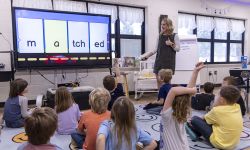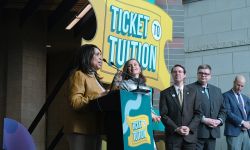Opinion: COVID will change Michigan education long after the pandemic
Since mid-March 2020, traditional schools and districts throughout the United States were forced to adopt remote teaching and learning practices as a result of extended school closures caused by the COVID-19 pandemic.
As our educational system was being turned on its head, schools and teachers took courageous steps to adjust to remote learning models and kept learning a focal point for students. This pivot to an emergency remote learning model required often heroic efforts to keep children safe and successful in the classroom.

Certainly, there were challenges along the way, but what has become abundantly clear in these difficult times is this: we are on the precipice of a fundamental shift in our educational structure. We have an opportunity for immense innovation and growth directly in front of us. We must seize this chance to permanently alter – for the better – our learning systems.
As traditional face-to-face learning teachers have worked tirelessly to implement effective virtual learning practices, many have struggled without the time and preparation that comes with formal professional learning experiences focused on pedagogy in these virtual environments. Yet, schools and districts that had already implemented effective virtual teaching and learning practices prior to the COVID-19 outbreak experienced greater degrees of success than their counterparts.
Teachers and school leaders of established virtual schools or programs that had previously invested time and energy in the development of effective pedagogical skills and student supports, saw higher student success in virtual or remote learning environments. Looking at these schools and districts, we can see clear learning opportunities from their model compared to the pre-COVID and even ‘pandemic teaching’ models our educational system has traditionally relied on.
We must embrace flexible learning models. If COVID has shown us anything, it’s that there is no such thing as a one-size-fits-all education system. When we try to apply standardized models to actual students, some will inevitably get left behind. What our students need from us is increased flexibility, more choice, and agility in the system designed to help them succeed in life.
Education should be personalized using student-centered and competency-based systems. Every school has a unique set of needs and challenges, including some that may vary wildly between two schools within the same district. Research shows that education is most effective when students have voice, choice, and agency over their own learning and are allowed to progress at their own pace as they demonstrate mastery of academic content and related skills. Working alongside local educators and communities who know their students best will help schools to define their vision and create systems specifically designed for individual student success.
Family engagement is essential. As a result of virtual learning from the same house as stay-at-home working family members, caregivers and parents are more involved in education than ever before, or at least since the days of a one-room schoolhouse. Having family support at home, in addition to in a classroom (no matter the setting) is vital to student success. As we begin to restore some balance to family structures, now is the time to retain the active engagement of caregivers over the past year in the success of students going forward.
Education is probably never going to be the same as it was prior to COVID-19, nor should it. The disruptions caused by the pandemic have sharpened our awareness of educational gaps, and as a result, the unique opportunity we have to address them.
We’ve asked so much of teachers, families, and students this year. Let’s show them that we too, as educational and policy leaders but more importantly as adults, can learn and grow as well.
See what new members are saying about why they donated to Bridge Michigan:
- “In order for this information to be accurate and unbiased it must be underwritten by its readers, not by special interests.” - Larry S.
- “Not many other media sources report on the topics Bridge does.” - Susan B.
- “Your journalism is outstanding and rare these days.” - Mark S.
If you want to ensure the future of nonpartisan, nonprofit Michigan journalism, please become a member today. You, too, will be asked why you donated and maybe we'll feature your quote next time!




